高中英语 VOA美国习惯用语讲座(文本) 第382讲 pass the buck素材
最新-高中英语 VOA美国习惯用语讲座(文本) 第443 behi
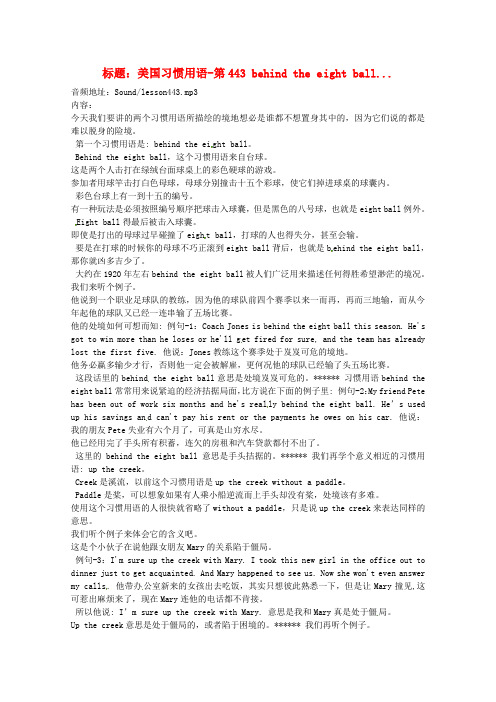
标题:美国习惯用语-第443 behind the eight ball...音频地址:Sound/lesson443.mp3内容:今天我们要讲的两个习惯用语所描绘的境地想必是谁都不想置身其中的,因为它们说的都是难以脱身的险境。
第一个习惯用语是: behind the ei ght ball。
Behind the eight ball,这个习惯用语来自台球。
这是两个人击打在绿绒台面球桌上的彩色硬球的游戏。
参加者用球竿击打白色母球,母球分别撞击十五个彩球,使它们掉进球桌的球囊内。
彩色台球上有一到十五的编号。
有一种玩法是必须按照编号顺序把球击入球囊,但是黑色的八号球,也就是eight ball例外。
Eight ball得最后被击入球囊。
即使是打出的母球过早碰撞了eigh t ball,打球的人也得失分,甚至会输。
要是在打球的时候你的母球不巧正滚到eight ball背后,也就是b ehind the eight ball,那你就凶多吉少了。
大约在1920年左右behind the eight ball被人们广泛用来描述任何得胜希望渺茫的境况。
我们来听个例子。
他说到一个职业足球队的教练,因为他的球队前四个赛季以来一而再,再而三地输,而从今年起他的球队又已经一连串输了五场比赛。
他的处境如何可想而知: 例句-1:Coach Jones is behind the eight ball this season. He's got to win more than he loses or he'll g et fired for sure, and the team has already lost the first five. 他说:Jones教练这个赛季处于岌岌可危的境地。
他务必赢多输少才行,否则他一定会被解雇,更何况他的球队已经输了头五场比赛。
这段话里的behind the eight ball意思是处境岌岌可危的。
VOA美国习惯用语1-50课
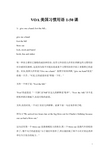
VOA美国习惯用语1-50课1:give one a hand; foot the bill...give me a handfoot the billblow outlock, stock and barrelhook, line and sinker每一种语言都有它独特的成语和俗语。
而学习外语的人经常在理解这些习惯用语时会感到很困难。
这是因为你不可能从组成某个习惯用语的字面上来懂得它的意思。
比如,美国人经常说:"Give me a hand." 按照字面来理解, "give me hand"就是"给我一只手。
"可是,它的意思却是"帮我一下忙。
"另外一个例子是: "Foot the bill.""Foot"的意思是"一只脚",而"bill"在这儿的解释是"账单"。
"Foot the bill."并不是把帐单踩在脚底下,而是付账的意思。
另外,有的时候,一个词汇有好几种解释。
就拿下面一句话来作例子吧:例句-1:"We arrived two hours late at the big blow-out for Charlie's birthday because our car had a blow-out."这句话里第一个blow-out是指规模很大的聚会,第二个blow-out是指汽车的轮胎炸了。
整个句子的意思是:"由于我们车胎炸了,所以我们晚了两个小时才到达查理举行生日宴会的地方。
"还有一些习惯用语从字典上的意思来看是相同的,但是它们使用的场合却不同。
下面两个习惯用语就是很好的例子。
一个是"Lock, stock and barrel",另外一个是:"Hook, line and sinker"。
高中英语VOA习惯用语第382讲passthebuck素材
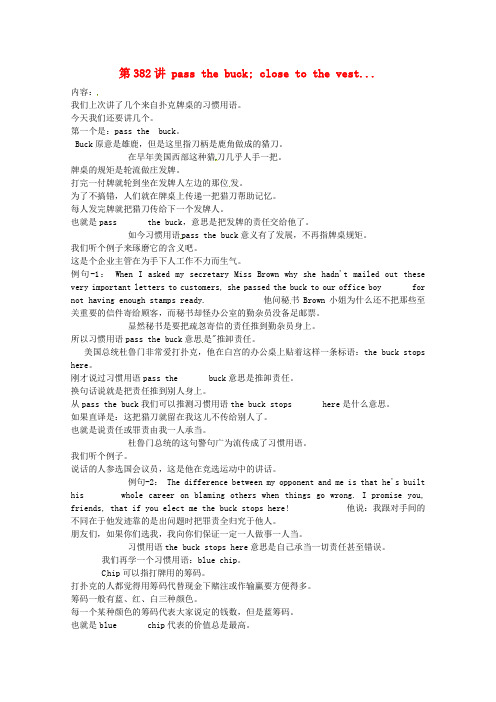
第382讲 pass the buck; close to the vest...内容:我们上次讲了几个来自扑克牌桌的习惯用语。
今天我们还要讲几个。
第一个是:pass the buck。
Buck原意是雄鹿,但是这里指刀柄是鹿角做成的猎刀。
在早年美国西部这种猎刀几乎人手一把。
牌桌的规矩是轮流做庄发牌。
打完一付牌就轮到坐在发牌人左边的那位发。
为了不搞错,人们就在牌桌上传递一把猎刀帮助记忆。
每人发完牌就把猎刀传给下一个发牌人。
也就是pass the buck,意思是把发牌的责任交给他了。
如今习惯用语pass the buck意义有了发展,不再指牌桌规矩。
我们听个例子来琢磨它的含义吧。
这是个企业主管在为手下人工作不力而生气。
例句-1: When I asked my secretary Miss Brown why she hadn't mailed out these very important letters to customers, she passed the buck to our office boy fornot having enough stamps ready. 他问秘书Brown小姐为什么还不把那些至关重要的信件寄给顾客,而秘书却怪办公室的勤杂员没备足邮票。
显然秘书是要把疏忽寄信的责任推到勤杂员身上。
所以习惯用语pass the buck意思是"推卸责任。
美国总统杜鲁门非常爱打扑克,他在白宫的办公桌上贴着这样一条标语:the buck stops here。
刚才说过习惯用语pass the buck意思是推卸责任。
换句话说就是把责任推到别人身上。
从pass the buck我们可以推测习惯用语the buck stops here是什么意思。
如果直译是:这把猎刀就留在我这儿不传给别人了。
也就是说责任或罪责由我一人承当。
杜鲁门总统的这句警句广为流传成了习惯用语。
高中英语 VOA美国习惯用语讲座(文本) 第430 the whole shooting match
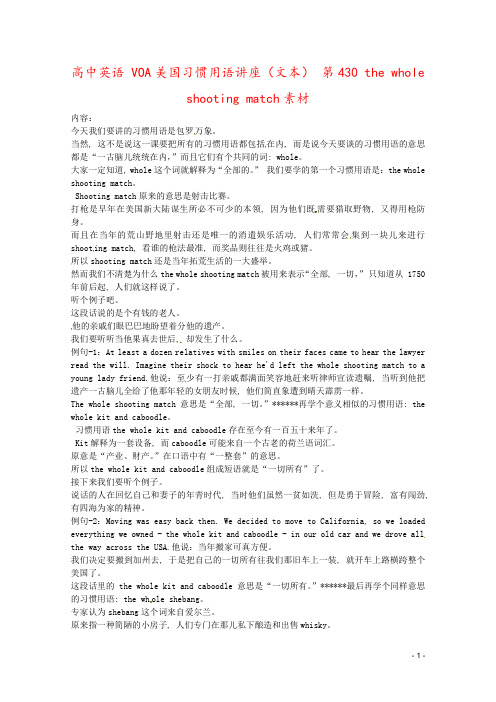
高中英语 VOA美国习惯用语讲座(文本)第430 the wholeshooting match素材内容:今天我们要讲的习惯用语是包罗万象。
当然, 这不是说这一课要把所有的习惯用语都包括在内, 而是说今天要谈的习惯用语的意思都是“一古脑儿统统在内,”而且它们有个共同的词: whole。
大家一定知道, whole这个词就解释为“全部的。
”我们要学的第一个习惯用语是:the whole shooting match。
Shooting match原来的意思是射击比赛。
打枪是早年在美国新大陆谋生所必不可少的本领, 因为他们既需要猎取野物, 又得用枪防身。
而且在当年的荒山野地里射击还是唯一的消遣娱乐活动, 人们常常会集到一块儿来进行shoot ing match, 看谁的枪法最准, 而奖品则往往是火鸡或猪。
所以shooting match还是当年拓荒生活的一大盛举。
然而我们不清楚为什么the whole shooting match被用来表示“全部, 一切,”只知道从 1750年前后起, 人们就这样说了。
听个例子吧。
这段话说的是个有钱的老人。
他的亲戚们眼巴巴地盼望着分他的遗产。
我们要听听当他果真去世后,却发生了什么。
例句-1:At least a dozen relatives with smiles on their faces came to hear the lawyer read the will. Imagine their shock to hear he'd left the whole shooting match to a young lady friend.他说:至少有一打亲戚都满面笑容地赶来听律师宣读遗嘱, 当听到他把遗产一古脑儿全给了他那年轻的女朋友时候, 他们简直象遭到晴天霹雳一样。
The whole shooting match意思是“全部, 一切。
”******再学个意义相似的习惯用语: the whole kit and caboodle。
英语演讲原文:奥巴马演讲 给美国的失业者提供救济
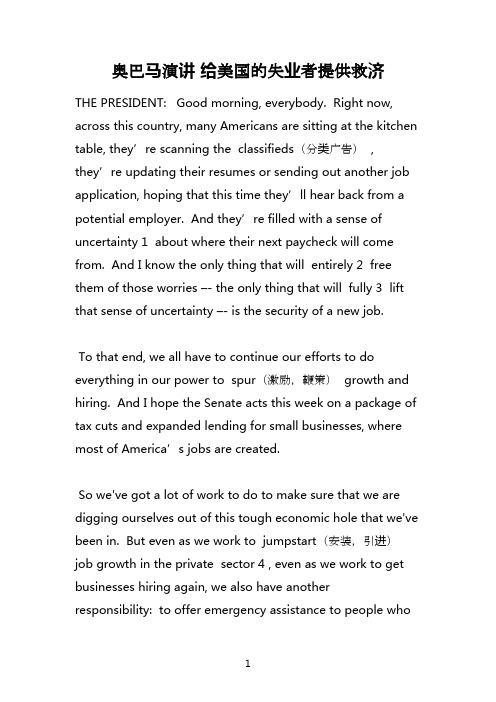
奥巴马演讲给美国的失业者提供救济THE PRESIDENT: Good morning, everybody. Right now, across this country, many Americans are sitting at the kitchen table, they’re scanning the classifieds(分类广告) , they’re updating their resumes or sending out another job application, hoping that this time they’ll hear back from a potential employer. And they’re filled with a sense of uncertainty 1 about where their next paycheck will come from. And I know the only thing that will entirely 2 free them of those worries –- the only thing that will fully 3 lift that sense of uncertainty –- is the security of a new job.To that end, we all have to continue our efforts to do everything in our power to spur(激励,鞭策) growth and hiring. And I hope the Senate acts this week on a package of tax cuts and expanded lending for small businesses, where most of America’s jobs are created.So we've got a lot of work to do to make sure that we are digging ourselves out of this tough economic hole that we've been in. But even as we work to jumpstart(安装,引进)job growth in the private sector 4 , even as we work to get businesses hiring again, we also have another responsibility: to offer emergency assistance to people whodesperately 5 need it -- to Americans who’ve been laid off in this recession. We've got a responsibility to help them make ends meet(收支相抵,量入为出) and support their families even as they’re looking for another job.That’s why it’s so essential to pass the unemployment insurance extension that comes up for a vote tomorrow. We need to pass it for men like Jim Chukalas, who’s with me here today. Jim worked as a parts manager at a Honda dealership 6 until about two years ago. He’s posted resumes everywhere. He’s gone door-to-door looking for jobs. But he hasn’t gotten a single interview.He’s trying to be strong for his two young kids, but now that he’s exhausted 7 his unemployment benefits, that’s getting harder to do.We need to pass it for women like Leslie Macko, who lost her job at a fitness center last year and has been looking for work ever since. Because she’s eligible 8 for only a few more weeks of unemployment, she’s doing what she never thought she’d have to do -- not at this point, anyway. She’s turning to her father for financial support.And we need to pass it for Americans like Denise Gibson, who was laid off from a real estate agency earlier thisyear. Denise has been interviewing for jobs -– but so far nothing has turned up. Meanwhile, she’s fallen further and further behind on her rent. And with her unemployment benefits set to expire(期满,终止), she’s worried about what the future holds.We need to pass it for all the Americans who haven’t been able to find work in an economy where there are five applicants 9 for every opening; who need emergency relief to help them pay the rent and cover their utilities and put food on the table while they’re looking for another job.And for a long time, there’s been a tradi tion –- under both Democratic and Republican Presidents –- to offer relief to the unemployed 10 . That was certainly the case under my predecessor 11 (前任,前辈) , when Republican senators voted several times to extend emergency unemployment benefits. But right now, these benefits –- benefits that are often the person’s sole source of income while they’re looking for work -– are in jeopardy 12 (危险) .And I have to say, after years of championing policies that turned a record surplus(剩余,盈余) into a massive deficit 13 , the same people who didn’t have any problem spending hundreds of billions of dollars on tax breaks for thewealthiest Americans are now saying we shouldn’t offer relief to middle-class Americans like Jim or Leslie or Denise, who really need help.Over the past few weeks, a majority of senators have tried -–not once, not twice, but three times –- to extend emergency relief on a temporary basis. Each time, a partisan 14 minority in the Senate has used parliamentary maneuvers 15 (军事演习) to block a vote, denying millions of people who are out of work much-needed relief. These leaders in the Senate who are advancing a misguided notion that emergency relief somehow discourages people from looking for a job should talk to these folks.That attitude I think reflects a lack of faith in the American people, because the Americans I hear from in letters and meet in town hall meetings –- Americans like Leslie and Jim and Denise -- they’re not looking for a handout 16 . They desperately want to work. Just right now they can’t find a job. These are honest, decent, hardworking folks who’ve fallen on hard times through no fault of their own, and who have nowhere else to turn except unemployment benefits and who need emergency relief to help them weather this economic storm.Now, tomorrow we will have another chance to offer them that relief, to do right by not just Jim and Leslie and Denise, but all the Americans who need a helping 17 hand right now -- and I hope we seize it. It’s tim e to stop holding workers laid off in this recession hostage to Washington politics. It’s time to do what’s right -- not for the next election but forthe middle class. We’ve got to stop blocking emergency relief for Americans who are out of work. We’ve got to extend unemployment insurance. We need to pass those tax cuts for small businesses and the lending for small businesses.Times are hard right now. We are moving in the right direction. I know it’s getting close to an election, but there are times where you put elections aside. This is one of those times. And that’s what I hope members of Congress onboth sides of the aisle 18 will do tomorrow.Thanks very much.END 11:00 A.M. EDT■文章重点单词注释:1uncertaintyn.易变,靠不住,不确知,不确定的事物参考例句:Her comments will add to the uncertainty of the situation.她的批评将会使局势更加不稳定。
高中VOA英语—美国习惯用语讲座(doc版) 第381讲 showdown素材

标题:美国习惯用语-第381讲 showdown; poker face...内容:今天我们要讲的习惯用语都出自美国最流行的一种赌博游戏:扑克。
扑克就像牛仔裤一样具有典型的美国风味。
打扑克似乎是牛仔生活中不可缺少的部分,因此西部电影里不少场景都是在扑克牌桌边上,而打牌的人摊牌那一霎那往往是最扣人心弦的时刻,因为对手们一决胜负在此一举,而且紧接而来的很可能是一场你死我活的枪战。
摊牌的英文就是:showdown。
Showdown原意是打牌的人下完赌注后把手上的牌翻开放到桌面上决一胜负看谁赢钱。
这是牌局的最后关头。
如今习惯用语showdown意义不再局限于牌桌。
我们听个例子来揣摩它的意思吧。
这是一个电台政治评论员在谈华盛顿一个重要政治事件。
例句-1:The White House and Congress are heading toward a major showdown later this week when the Senate votes on whether to approve the money the President wants for his most important program. 他说:这星期晚些时候参议院要投票表决是否批准为总统最重要的规划拨款。
白宫是美国总统宅邸,代表总统为首的美国政府,而参议院则是美国国会的上院,所以参议院表决是否拨款给总统提出的方案,实际上是白宫和国会决一胜负的关键,因此习惯用语showdown就是一决雌雄的最后较量。
****** 我们再学个习惯用语:ante up。
赌过扑克的人知道:每打一付牌参加者在没发牌前先得把相互说定的头注扔到桌面中间。
这下头注的钱就叫做ante。
这个词可以作动词。
例如在ante up这个短语里,它就是动词。
Ante up原意是拿出说定的头注钱来。
但是这个短语逐渐被广泛应用成为习惯用语。
我们听个例子来琢磨它的含义,说的是一个离婚的男子由于不付给前妻离婚协议内商定的子女赡养费而被逮捕并审判。
高中VOA英语—美国习惯用语讲座(doc版) 第384讲 trim one s sail素材
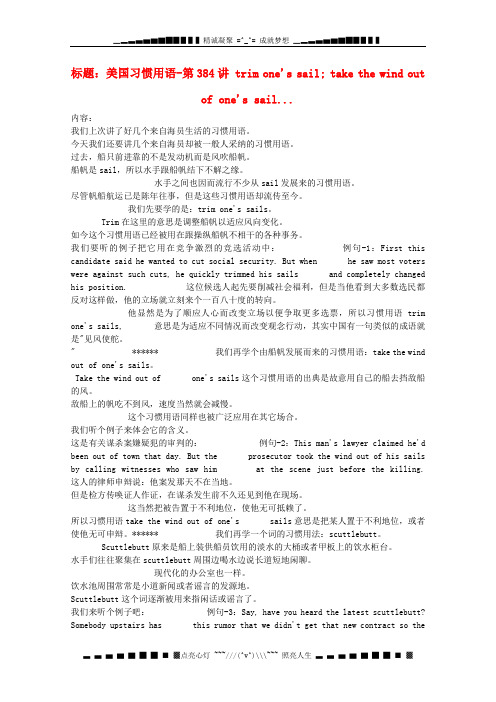
标题:美国习惯用语-第384讲 trim one's sail; take the wind outof one's sail...内容:我们上次讲了好几个来自海员生活的习惯用语。
今天我们还要讲几个来自海员却被一般人采纳的习惯用语。
过去,船只前进靠的不是发动机而是风吹船帆。
船帆是sail,所以水手跟船帆结下不解之缘。
水手之间也因而流行不少从sail发展来的习惯用语。
尽管帆船航运已是陈年往事,但是这些习惯用语却流传至今。
我们先要学的是:trim one's sails。
Trim在这里的意思是调整船帆以适应风向变化。
如今这个习惯用语已经被用在跟操纵船帆不相干的各种事务。
我们要听的例子把它用在竞争激烈的竞选活动中:例句-1:First thiscandidate said he wanted to cut social security. But when he saw most voterswere against such cuts, he quickly trimmed his sails and completely changedhis position. 这位候选人起先要削减社会福利,但是当他看到大多数选民都反对这样做,他的立场就立刻来个一百八十度的转向。
他显然是为了顺应人心而改变立场以便争取更多选票,所以习惯用语trimone's sails, 意思是为适应不同情况而改变观念行动,其实中国有一句类似的成语就是"见风使舵。
" ****** 我们再学个由船帆发展而来的习惯用语:take the windout of one's sails。
Take the wind out of one's sails这个习惯用语的出典是故意用自己的船去挡敌船的风。
敌船上的帆吃不到风,速度当然就会减慢。
这个习惯用语同样也被广泛应用在其它场合。
高中英语 VOA美国习惯用语讲座(文本) 第391讲 take the bull by horn素材

标题:美国习惯用语-第391讲 take the bull by horn...音频地址:Sound/l esson391.mp3内容:我们今天要学的习惯用语都带有这个词horn。
Horn这个词有几种不同意思。
首先它可以指象公牛之类大型雄性动物头上长的角。
在我们今天学的第一个习惯用语里horn就是这个意思: take the bull by the horns。
Bull是公牛。
公牛有时是一种危险的动物。
它野性发作时,会挺着头上尖锐坚硬的牛角向人直冲过来。
那对锐不可当的牛角可是致命武器。
历年来不知有多少西班牙斗牛士是在牛角下丧命的。
习惯用语take the bull by the horns要是直译就是手执牛角制服公牛。
这是个相当古老的习惯用语,流传至今有两百多年了。
它的确切出典已经不清楚。
有一种说法是这个习惯用语起源于牧牛场。
当一头怒气冲天的公牛直冲你而来的时候,你自卫反击的办法之一就是迎它而上,双手果断利落地紧紧抓住它头上两角,然后竭尽全力扭转牛头,使公牛失去平衡摔倒而被你制服。
当然这样做是需要临危不惧,迎着困难而上的勇敢精神的。
我们来听个例子。
说话的人终于鼓起了勇气准备去上级办公室要求加工资了。
例句-1: I'm not waiting any longer for the boss to give me the raise I deserve. I'm going to take the bull by the horns, march in and tell him I want more money or I'm leaving for ano ther job. 他说:我再也不乖乖地等着老板来给我加工资了。
我该得到更高的报酬,我要鼓足勇气迎困难而上;我打算去老板办公室直截了当地对他说:要不给我更高的报酬,我就辞职另谋出路了。
他决定不再听任老板的摆布,而要采取主动、据理力争,所以这里的take the bull by the horns含义是不畏权势,迎着困难而上。
高中英语 VOA美国习惯用语讲座(文本) 第388讲 paper pusher素材
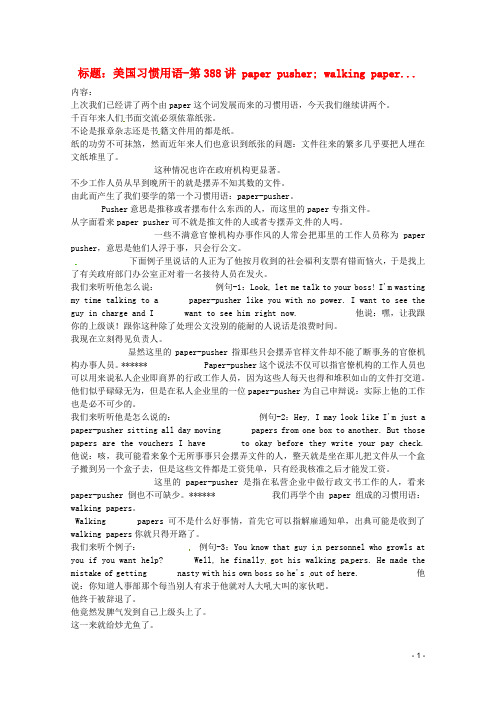
标题:美国习惯用语-第388讲 paper pusher; walking paper...内容:上次我们已经讲了两个由paper这个词发展而来的习惯用语,今天我们继续讲两个。
千百年来人们书面交流必须依靠纸张。
不论是报章杂志还是书籍文件用的都是纸。
纸的功劳不可抹煞,然而近年来人们也意识到纸张的问题:文件往来的繁多几乎要把人埋在文纸堆里了。
这种情况也许在政府机构更显著。
不少工作人员从早到晚所干的就是摆弄不知其数的文件。
由此而产生了我们要学的第一个习惯用语:paper-pusher。
Pusher意思是推移或者摆布什么东西的人,而这里的paper专指文件。
从字面看来paper pusher可不就是推文件的人或者专摆弄文件的人吗。
一些不满意官僚机构办事作风的人常会把那里的工作人员称为paperpusher,意思是他们人浮于事,只会行公文。
下面例子里说话的人正为了他按月收到的社会福利支票有错而恼火,于是找上了有关政府部门办公室正对着一名接待人员在发火。
我们来听听他怎么说:例句-1:Look, let me talk to your boss! I'm wastingmy time talking to a paper-pusher like you with no power. I want to see theguy in charge and I want to see him right now. 他说:嘿,让我跟你的上级谈!跟你这种除了处理公文没别的能耐的人说话是浪费时间。
我现在立刻得见负责人。
显然这里的paper-pusher指那些只会摆弄官样文件却不能了断事务的官僚机构办事人员。
****** Paper-pusher这个说法不仅可以指官僚机构的工作人员也可以用来说私人企业即商界的行政工作人员,因为这些人每天也得和堆积如山的文件打交道。
他们似乎碌碌无为,但是在私人企业里的一位paper-pusher为自己申辩说:实际上他的工作也是必不可少的。
最新-高中英语 VOA美国习惯用语讲座(文本) 第386讲 go

标题:美国习惯用语-第386讲 go to bat for; right off thebat...内容:棒球问世至今有两百来年了,如今可说是美国的国球。
举国上下不论男女老少热中棒球的都大有人在。
在许多美国人的日常生活中棒球占了必不可少的位置。
这也反映在语言里面。
不少棒球赛的行话被普遍运用,即使对棒球没兴趣的人也用上了那些棒球语言。
运动员是用球棒击打棒球的。
球棒是bat。
我们今天介绍的习惯用语都包括bat这个词。
第一个是:go to bat for。
Go to bat原来指轮到击球的人上前去击球。
如果这名球员身体或者竞技状态欠佳,那么另一名球员就会go to bat for him。
意思是帮他一把,代替他去击球。
这句话逐渐被广泛用在和棒球无关的种种方面。
我们听个例子吧。
例句-1:When the Lee family on our street had a fire and got burned outof their house, the neighbors went to bat for them with food, clothes and aplace to sleep. 他说:跟我们同一条街的Lee一家发生火灾。
房子烧毁了,如今无家可归,邻居们都向他们伸出援手,送他们吃的、穿的,还供他们住宿。
一家邻居遭到不测、衣食住行产生困难时,大家都慷慨赠送生活必需品。
这不亚于雪中送炭,所以这里的went to bat for them解释向处于困境的他们提供援助,而习惯用语go to bat for。
意思就是向困难的人伸出援手,或者为有难处的人出力。
****** 电台和电视记者在谈论政治和国际时事的时候也常常会用到go to bat for这个习惯用语。
下面就有个例子。
这段新闻摘录说的是某亚洲国家的总理访问邻国。
例句-2:During his visit to the foreign capital, the Prime Minister wentto bat for business men back home by talking to his hosts about the opportunities for inve stment in his country. 他说:首相在访问邻国首都的时候向东道主谈起他国内投资的大好机会。
最新-高中英语 VOA美国习惯用语讲座(文本) 第428 dig
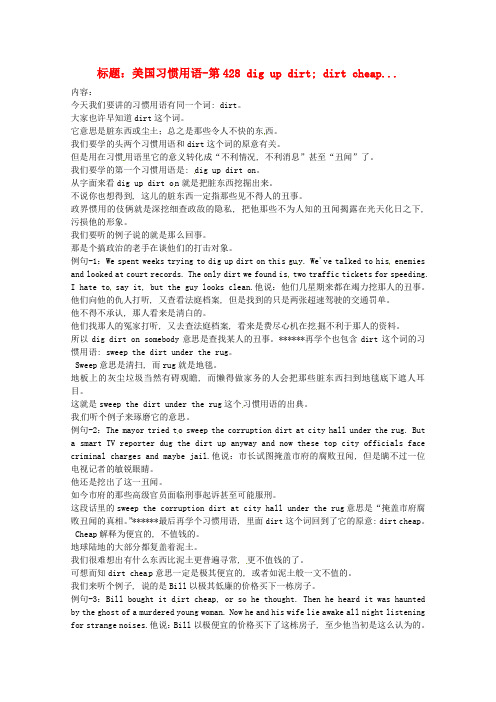
标题:美国习惯用语-第428 dig up dirt; dirt cheap...内容:今天我们要讲的习惯用语有同一个词: dirt。
大家也许早知道dirt这个词。
它意思是脏东西或尘土;总之是那些令人不快的东西。
我们要学的头两个习惯用语和dirt这个词的原意有关。
但是用在习惯用语里它的意义转化成“不利情况, 不利消息”甚至“丑闻”了。
我们要学的第一个习惯用语是: dig up dirt on。
从字面来看dig up dirt o n就是把脏东西挖掘出来。
不说你也想得到, 这儿的脏东西一定指那些见不得人的丑事。
政界惯用的伎俩就是深挖细查政敌的隐私, 把他那些不为人知的丑闻揭露在光天化日之下, 污损他的形象。
我们要听的例子说的就是那么回事。
那是个搞政治的老手在谈他们的打击对象。
例句-1:We spent weeks trying to dig up dirt on this gu y. We've talked to his enemies and looked at court records. The only dirt we found is two traffic tickets for speeding.I hate to say it, but the guy looks clean.他说:他们几星期来都在竭力挖那人的丑事。
他们向他的仇人打听, 又查看法庭档案, 但是找到的只是两张超速驾驶的交通罚单。
他不得不承认, 那人看来是清白的。
他们找那人的冤家打听, 又去查法庭档案, 看来是费尽心机在挖掘不利于那人的资料。
所以dig dirt on somebody意思是查找某人的丑事。
******再学个也包含dirt这个词的习惯用语: sweep the dirt under the rug。
Sweep意思是清扫, 而rug就是地毯。
地板上的灰尘垃圾当然有碍观瞻, 而懒得做家务的人会把那些脏东西扫到地毯底下遮人耳目。
高中英语 VOA美国习惯用语讲座(文本) 第372讲 flashback素材

标题:美国习惯用语-第372讲 flashback; slapstick...内容:我们今天要讲几个和电影业有关的习惯说法。
第一个:flashback。
Flash意思是闪光。
Flashback这个说法是1915年前后开始出现在好莱坞制片过程中的。
凡是电影里穿插的回顾过去的场景就称为flashback。
比方说在一部描述一个老人的电影里时而会复现老人二十时发生的事情。
那么这段回忆镜头就是flashback。
如今flashback这个词被广泛应用在日常语言中。
让我们听个例子来体会它的含义。
说话的人在机场巧遇二十五年没见面的老同学。
我们来听听他怎么说。
例句-1:As soon as I saw Charley, I had a flashback to that day at the swimming pool when I was only seven. By accident, I fell into the deep end and Charley jumped in and saved my life. 他说:我一看到Charley就立刻回想起游泳池边上的那一天。
当时我还只七岁,一不小心掉进了深水里,是Charley跳进水里救了我的命。
刚才说过他和Charley有二十五年不见,但是机场巧遇却促使七岁时的往事在眼前闪现,可见flashback用来描述对往事的回忆突然在心头浮现。
****** 我们再学个习惯说法: slapstick。
Slapstick是个复合词。
其中slap是啪嗒啪嗒的敲击声,而stick是棍棒。
Slapstick出典是这样:每当舞台滑稽戏里小丑摔跤或者挨打的时候,后台就敲击棍棒发出响亮的啪嗒声加添现场效果来逗笑。
这种趣味低俗的滑稽戏多的就是这一套纯粹以肢体动作来逗乐的笑料,于是人们用sla pstick来指品位不高的滑稽戏了。
后来电影也用slapstick这个词指那种庸俗喧闹的闹剧。
- 1、下载文档前请自行甄别文档内容的完整性,平台不提供额外的编辑、内容补充、找答案等附加服务。
- 2、"仅部分预览"的文档,不可在线预览部分如存在完整性等问题,可反馈申请退款(可完整预览的文档不适用该条件!)。
- 3、如文档侵犯您的权益,请联系客服反馈,我们会尽快为您处理(人工客服工作时间:9:00-18:30)。
高中英语 VOA美国习惯用语讲座(文本)第382讲 pass the
buck素材
音频地址:Sound/lesson382.mp3
内容:
我们上次讲了几个来自扑克牌桌的习惯用语。
今天我们还要讲几个。
第一个是:pass the buck。
Buck原意是雄鹿,但是这里指刀柄是鹿角做成的猎刀。
在早年美国西部这种猎刀几乎人手一把。
牌桌的规矩是轮流做庄发牌。
打完一付牌就轮到坐在发牌人左边的那位发。
为了不搞错,人们就在牌桌上传递一把猎刀帮助记忆。
每人发完牌就把猎刀传给下一个发牌人。
也就是pass the buck,意思是把发牌的责任交给他了。
如今习惯用语pass the buck意义有了发展,不再指牌桌规矩。
我们听个例子来琢磨它的含义吧。
这是个企业主管在为手下人工作不力而生气。
例句-1: When I asked my secretary Miss Brown why she hadn't mailed out
these very important letters to customers, she passed the buck to our office
boy for not having enough stamps ready. 他问秘书Brown小姐为什
么还不把那些至关重要的信件寄给顾客,而秘书却怪办公室的勤杂员没备足邮票。
显然秘书是要把疏忽寄信的责任推到勤杂员身上。
所以习惯用语pass the buck意思是"推卸责任。
" ****** 美国总统杜鲁门非常爱打扑克,他在白宫的办公桌上贴
着这样一条标语:the buck stops here。
刚才说过习惯用语pass the buck意思是推卸责任。
换句话说就是把责任推到别人身上。
从pass the buck我们可以推测习惯用语the buck stops here是什么意思。
如果直译是:这把猎刀就留在我这儿不传给别人了。
也就是说责任或罪责由我一人承当。
杜鲁门总统的这句警句广为流传成了习惯用语。
我们听个例子。
说话的人参选国会议员,这是他在竞选运动中的讲话。
例句-2: The difference between my opponent and me is that he's built
his whole career on blaming others when things go wrong. I promise you, friends, that if you elect me the buck stops here! 他说:我跟对手间的
不同在于他发迹靠的是出问题时把罪责全归究于他人。
朋友们,如果你们选我,我向你们保证一定一人做事一人当。
习惯用语the buck stops here意思是自己承当一切责任甚至错误。
****** 我们再学一个习惯用语:blue chip。
C hip可以指打牌用的筹码。
打扑克的人都觉得用筹码代替现金下赌注或作输赢要方便得多。
筹码一般有蓝、红、白三种颜色。
每一个某种颜色的筹码代表大家说定的钱数,但是蓝筹码。
也就是blue chip代表的价值总是最高。
Blue chip这说法逐渐被广泛应用。
例如在证券交易市场上投资人说blue-chip stocks指长期以来价值一
贯上升的股票。
这当然是最好的股票了,而且这儿blue-chip是形容词,修饰名词sto cks。
Blue-chip还用在其它场合。
它是什么意思呢?我们来听个例子。
例句-3: Bill, if you're looking for a good lawyer for that important case, you ought to talk to my cousin Bernie -- he's a partner in a
real blue-chip law firm, one of the best in town. 他向Bill建议
如果要找好律师来办这重要案件就得跟他表兄Bernie谈谈,因为Bernie是城里最好的一家
律师事务所的合伙人。
他说这是一家blue-chip law firm,又说这家事务所是one of the best in town,可见blue-chip意思就是"最好的。
" ****** 最后再学个习惯用语:close to the vest。
Vest是背心。
过去人们常在衬衫外穿件背心。
扑克老手是绝对不让别人有机会看到他手上牌的,所以他拿着的牌总是紧贴自己的前胸,在
靠近背心的部位。
也就是close to the vest。
这样谁也没法偷看他手上掌握的秘密了。
习惯用语close to the vest出典就在这儿。
让我们听个例子来揣摩这个习惯用语的含义。
例句-4:Everybody is wondering who the president will appoint to the vacant chair on the supreme court. But he's playing his cards close to his vest and nobody really knows who it will be. 他说:大家都在猜测总统会任命
谁填补最高法院内的空缺,然而总统却严守机密,谁也无法探知他心目中的人选。
可见习惯用语close to the vest意思是"严守机密。
"
.。
